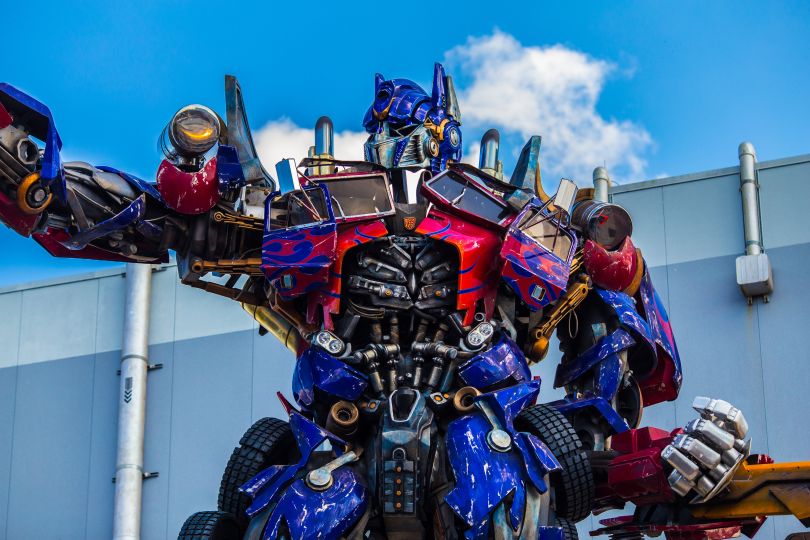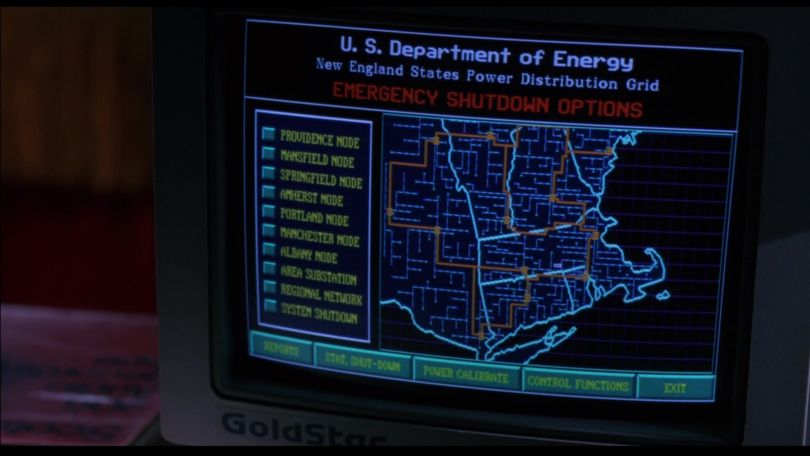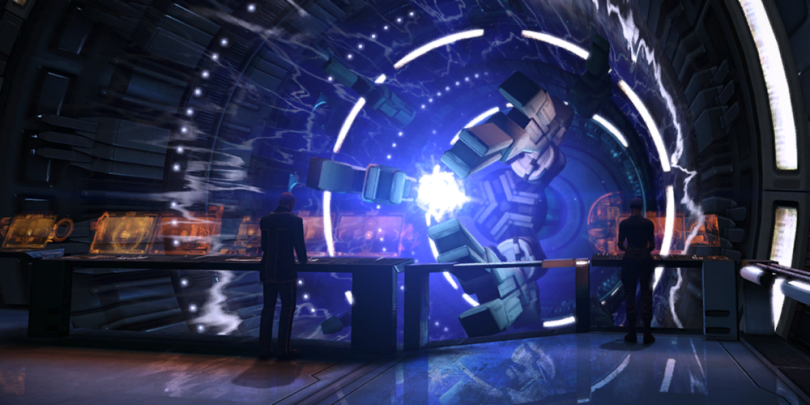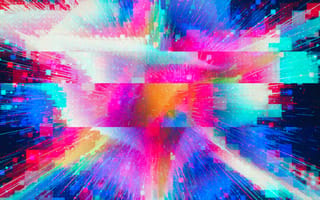First of all, let’s get one thing straight: Quantum computers are real.
You can play with some simple ones right now in IBM’s quantum cloud lab. And every day, researchers are working toward building quantum computers that in 10 years may be able to break the entire foundation of digital security. (Don’t worry, they’re also working on a fix for that.)
But we’re still in the early dawn of the quantum computing age. That means what these machines will be able to accomplish in the future largely remains to be seen.
So it’s no wonder the subject matter is such fertile ground for the imagination. Some of the science that quantum computers are based on is downright spooky — like how a quantum particle can behave as though it’s in multiple states at once, called a quantum superposition, but always collapses into one state or another when it’s measured. In movies, TV shows and other forms of entertainment, quantum computers are everything from stand-ins for supercomputers to near-magical devices that can bend the laws of physics and reality itself.
What Is the State of Quantum Computing?
As a result, you’re probably confused about quantum computing’s true capabilities. Would quantum computers be just another way of powering a laptop, like swapping out your Intel processor for AMD? Is it the gateway to sentient artificial intelligence and Skynet? Is it a portal into the Marvel multiverse where you can watch all the Marvel movies that will ever exist in the history of the multiverse?
To get some clarity, we called up John Donohue, scientific outreach manager at the University of Waterloo’s Institute for Quantum Computing. (And he gives a pretty awesome lecture about quantum computing in the movies, which he uses to teach university students the basics of quantum mechanics.)
We asked him to give his scientific assessment of five quantum-centric media productions and tell us what they get right — and wrong — about our quantum computing future.
Our Quantum Computing Future, According to…

Transcendence (2014)
Quick Reel: In this 2014 film, brilliant AI scientist Will Caster, played by Johnny Depp, is trying to build a sentient AI computer, much to the displeasure of an anti-technology terrorist group that carries out his assassination. But wait! Before he dies from his radioactive bullet wound, his colleagues upload his mind onto the giant quantum computer they happened to have built (on the side, presumably). Suffice to say that once the newly disembodied but conscious Caster asks to be connected to the internet, things do not go smoothly.
Quantum hot take: Donohue says the movie isn’t far off in its depiction of quantum computers, but mostly because it doesn’t take a lot of big swings. In Transcendence, they’re only referred to as “quantum processors” and seen humming along in a large server center.
Donohue said the quantum computers of the future probably won’t look like the normal-looking computer servers seen in the movie. That’s because quantum computers aren’t all-purpose machines like our current classical computers — they’re just better at doing certain types of tasks.
For example, quantum computers may be able to find the factors of large numbers in seconds, a type of mathematical calculation that would take trillions of years for classical computers. But for other tasks, quantum computers are just kind of average.
“For certain things — like multiplying numbers together, for example — there’s no advantage to using a quantum computer over a classical computer,” Donohue said.
Quantum computers are also more fragile and expensive to operate than classical computers, so we’d probably still use classical computers for most tasks, even once we can build good quantum computers. In the future, according to Donohue, quantum computers would probably always be used together with classical computers, as classical-quantum computing systems.
“For certain things — like multiplying numbers together, for example — there’s no advantage to using a quantum computer over a classical computer.”
That’s all to say that, if the movie cared more about accuracy, Depp’s consciousness would have been uploaded onto a system of classical computers working in conjunction with quantum computers, instead of a single large quantum computer.
“If we find that quantum computers can help for AI and we end up using it for things like building transforming cars and uploading Johnny Depp to the internet,” Donohue said, “then we would definitely expect it’d be something that would be running as kind of a very, very small part of what is overall a much larger computation.”
Final accuracy rating: Spin down. (Donohue: “It would have had a spin to the side or maybe even a spin moderately up for the quantum stuff, but then it decided to go way too deep into, like, nanotechnology and just started making up a whole bunch of stuff.”)
Final entertainment rating: Spin down. (Donohue: “If it was anyone but Johnny Depp, it would have worked. You hire Captain Jack Sparrow and you just have them stare methodically at a camera for a whole two hours? I never believed he wasn’t a robot.”)

Transformers (2007)
Quick Reel: Shia LaBeouf and Megan Fox are Sam Witwicky and Mikaela Banes, two teenagers caught in the middle of an epic battle between the evil Decepticons and the good Autobots (one of which happens to be disguised as an old Camaro). Meanwhile, the U.S. government, with help from some friendly high-school hackers, realizes that these robots are actually sentient and intelligent. “The signal pattern is learning, it’s evolving on its own and you need to move past Fourier transforms and start thinking quantum mechanics,” one FBI analyst realizes.
Quantum hot take: Quantum computing doesn’t have a huge cameo in this movie — but, like in Transcendence, it’s used as a bridge to a bigger plot device: the rise of sentient AI. In both these movies, powerful quantum computers allow AI technology to finally take off.
“I do want to be a bit careful here,” Donohue said about how the academic fields of AI and quantum computing actually intersect in the real world.
The truth is, researchers are not far enough along in their understanding of either AI algorithms or quantum computing to say for sure whether, and how, quantum computers will advance the field of AI.
Machine learning work is based on math, especially on optimization techniques that can find optimal solutions while only needing minimal human guidance. The hope is that quantum computers might be able to offer new ways of approaching and solving some types of optimization problems.
“It offers more computing power, and that might be possibly useful for helping to run some of these larger artificial intelligence problems,” Donohue said.
Whether that pans out remains to be seen, because quantum computing is still in the nascent stages of research.
There are some early glimmers of optimism. Researchers already see potential in using quantum computers to understand natural phenomena in the physical sciences, such as chemistry and physics.
But when it comes to creating the kind of sentient machines that most people still think of when they talk about AI — that research still has a long, long way to go. That’s why predicting whether quantum computing can create sentient robots is pure speculation. Probably better to search the universe for the Allspark.
Final accuracy rating: Spin down. (Donohue: “Not a lot of science going on there.”)
Final entertainment rating: Spin to the side. (That means it’s a pretty fun time. Donohue: “At least the first one has some giant robots smashing each other.”)

Sneakers (1992)
Quick Reel: In this thriller comedy, a group of hackers led by Robert Redford’s Martin Bishop finds itself in possession of a powerful device that can crack any encryption, cleverly disguised as an answering machine. Bishop and the gang go to extremes to prevent the device from falling into the wrong hands and wreaking havoc on the world.
Quantum hot take: This movie came out in 1992, well before any quantum computers were developed. But there are some surprising parallels between what the movie’s code breaker can do and what quantum computers might actually be able to do in the real world.
During one scene in the movie, the hackers huddle around a computer, watching in astonishment as page after page of encrypted data is decrypted before their eyes. If their code-breaking device had been a quantum computer, it actually wouldn’t be far off base. Again, quantum computers will only be good for certain tasks — but at those tasks, they are very good. They can solve certain problems significantly faster than a classical computer.
For example, one of the major encryption methods used today, the RSA algorithm, is based on the fact that it’s extremely difficult to find the prime factors of large numbers. Even if you had a fleet of classical computers working 24/7 to crack the current 2,048-bit, 617 digit RSA standard, it would take, again, trillions of years to break each encryption. Meanwhile, it would take a quantum computer with a few thousand logical qubits (that’s “quantum bits”) about 10 seconds.
“For a quantum computer, it turns out that finding the prime factors of a number is equally difficult to multiplying two numbers together,” Donohue said.
That’s a game changer. We currently broadcast sensitive information like passwords, healthcare data and our most private text messages over the internet to each other, basically in the open. Given a big enough quantum computer, much of the world’s digital secrets would be vulnerable. That’s all thanks to something called Shor’s algorithm, which takes advantage of how quantum computers work to quickly calculate prime factors of large numbers.
Still, it’s a big if. To date, the biggest quantum computer consists of 256 qubits, which is significantly smaller than the thousands of qubits needed to break RSA. And, so far, the record for the largest number ever factored using quantum computers with Shor’s algorithm is a mediocre 21 — a few hundred digits shy of the current RSA standard.
Part of what makes quantum computers so difficult to build is that they are much more error prone than classical computers. Qubits very easily get incorrectly flipped, which is why many quantum computers operate under extremely cold temperatures, cooled to just above absolute zero to avoid the interference from nearby vibrating quantum particles.
An additional error correction step is to build around a thousand physical qubits for every qubit of logical computation power in a quantum computer.
“That’s where you kind of get up to the order of about a million qubits,” Donohue said.
That sure sounds like a lot of qubits — and it may take some time to achieve — but once a quantum computer is built with those specs, the computation power could pay off in spades.
“Error correction scales linearly,” Donohue said. “Meanwhile, if we’re talking about a large algorithm, we might be able to get an exponential advantage using quantum computers.”
Final rating: Donohue hasn’t seen this one yet. So, let’s say, superposition?

Mass Effect 2
Quick Reel: In this action RPG, you play a character that is sent on a mission across the universe. In order to communicate with others who are lightyears away, you use a quantum entanglement communicator to achieve lag-free communication at faster than the speed of light. The game explains how it works: Two quantum particles are entangled, so no matter how far away they are, an action on one particle will also affect the other.
Quantum hot take: Quantum entanglement is a real phenomenon where quantum particles, like photons or electrons, can interact and result in their physical properties becoming correlated. When you measure the position or momentum of one particle in a pair of entangled particles, that will also tell you the characteristic of the other particle, regardless of how far apart they are.
“On Earth, it’s been tested to hundreds of kilometers, and there have been some tests with photons shot down from space as well,” Donohue said. “So that has been proven as science fact — that this entanglement doesn’t know any distance. You can have two atoms or two photons that are separated by hundreds of kilometers, and they still share this quantum mechanical bond.”
So, are Mass Effect 2’s quantum entanglement communicators our smartphones of the future?
Unfortunately not, Donohue said. First of all, according to the theory of relativity, no information can travel faster than the speed of light. If you’re trying to use Mass Effect 2’s communicator to talk to someone lightyears away, the quickest you’re ever going to hear from them is lightyears later.
“I guess where a lot of fiction tends to get it wrong is that … just like a quantum computer cannot be used to solve every problem, that quantum mechanical bond cannot be used with arbitrary power.”
And the correlation between entangled particles also doesn’t extend to actions performed on them. If you do something to one of the particles it won’t also magically affect the other.
“I guess where a lot of fiction tends to get it wrong is that … just like a quantum computer cannot be used to solve every problem, that quantum mechanical bond cannot be used with arbitrary power,” Donohue said.
But while quantum entanglement can’t be exploited as a new kind of medium for faster-than-light communication, it may eventually be possible to use it for securing existing communication. Some researchers suggest that the linked properties of entangled particles could be used to check if an eavesdropper had accessed secret information.
“The basic idea is that when I measure a quantum system, I disturb it,” Donohue said. “So if I have two quantum systems being sent out, and someone who’s not supposed to be there measures it, they’re going to disturb it.”
The sender and receiver of the information could then use the properties of quantum entanglement to check whether the transmitted information was disturbed.
Final accuracy rating: Spin down. (Donohue: “The science is just dirt wrong there, unfortunately.”)
Final entertainment rating: Spin up. (Donohue: “Definitely a full spin up from an enjoyment perspective.”)

‘Devs’ (2020)
Quick Reel: This show is centered on a mysterious quantum computing company run by Nick Offerman’s Forest, which is home to research trying to use quantum computers to change time and space. So is that possible? Can quantum computers change the past and the future and reveal all the different possibilities of our future?
Quantum hot take: The way quantum computers are depicted in fiction, according to Donohue, can be broken down into two main categories. One way is to use them as a shorthand for processing power, to convince the audience that some character has access to a very powerful supercomputer. That’s kind of how the movie Transcendence uses it.
“It’s within the realm of speculation that, sure, some quantum pieces might be helpful,” Donohue said.
The other way quantum computers are depicted, like in “Devs” or the Marvel movie Ant-Man, goes beyond computing power and questions the fundamental nature of reality.
“That’s where you’re really taking advantage of the more mystical elements of quantum science to break down certain restrictions of not just classical computing, but classical physics,” he said.
The inspiration for this brand of quantum mysticism actually comes from serious quantum science debate, specifically the many-worlds interpretation of quantum mechanics. It’s a hypothesis that there are actually infinite versions of reality, each version branching off every time there are multiple possible outcomes from a quantum event.
Donohue said that while these different interpretations of quantum mechanics can be useful for scientists trying to understand the nature of quantum physics, the usefulness of these hypotheses don’t really extend to quantum computing.
“I don’t know if this needs to be said out loud, but quantum computers cannot help us extend ourselves into the past, into multiple dimensions and into alternate possible universes,” he said. “Even if we take for granted that a quantum computer is kind of extending into this multiverse realm — ultimately, when we measure it, we get an answer out and that answer is going to be whatever answer is in the universe that we have access to.”
OK, maybe that’s speculating a bit far with how the multiverse would work — but you get the idea.
Final rating: Superposition.
What Will Quantum Computers Give Us, Really?
Donohue said the real magic of quantum computing is in its potential to help scientists speed up research and development in areas like chemistry and quantum mechanics. Quantum computers are — perhaps not surprisingly — really good at optimization problems that let scientists predict how energy and subatomic particles in atoms are arranged.
That’s information that could have far-reaching practical applications beyond university classrooms.
“Molecular chemistry — which is used in pharmaceuticals — environmental capture schemes, designing new kinds of superconductors and solar cells: understanding these kinds of problems requires us to simulate quantum mechanics efficiently,” Donohue said. “Then we can speed up a lot of these tasks.”
But maybe don’t hold your breath about seeing that type of use case for quantum computers in the movies anytime soon.
“Let’s just say movies have yet to really find a way to romanticize what actually happens in research,” Donohue said.
He referred back to a scene in Transcendence, where Johnny Depp’s character and his wife are building groundbreaking technology in their garage alone, so unlike how actual groundbreaking research is done.
“These are really things that are team efforts,” Donohue said. “They’re not the beautiful brainchild of one super smart scientist … Lots of people working on it around the world: tons of students, tons of young scientists, tons of older scientists. One person cannot build a quantum computer.”




